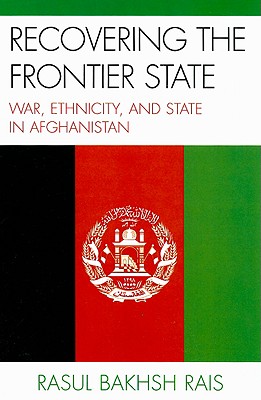This book examines the prospects for rebuilding state and nation in Afghanistan with regard to 'Operation Enduring Freedom' carried out by the international coalition. It starts off by delineating the conceptual basis of Afghanistan's status as a frontier state. Looking at geo_strategic aspects Afghanistan's position as an historical buffer between empires and its internal characteristics-_weak authority structure, internal conflicts, interventions by neighbors, legitimacy of internal conquest, and trans-national ethnicities, the book provides insights into the unique geo-political context of Afghanistan. Whilst the author deems the legacy of the previous intervention for containment as a major contributing factor to the disorder in Afghanistan's state and society, he draws on lessons from the past intervention to assuage current obstacles and stalemate that is hindering political, social, and economic development in Afghanistan. Focusing on the impediments to development in Afghanistan, the background against which the problem needs to be analyzed, and consequently countered, is effectively set out. Incessant war and insurgency has led to mobilization along ethnic and religious lines in Afghanistan and has had profound effects on the kinds of intuitions that have perpetuated over time. Ethnic and religious groups have applied constant pressure on the state and this dissonance has had enduring negative consequences on nation building, social cohesion, and state-society relationships. Pre-emptive and reactive intervention by neighboring states and their links to ethnic groups inside Afghanistan is another dimension which is analyzed. An extensive exploration into the geo-political history of social groups of Afghanistan with an intensive account of the rise of various power contenders as a function of their history, their links with external actors, and their traditional position in the indigenous vertical hierarchy are made. Unconventional war and counter-insurgency operations funded by foreign and local elements are examined and policy guidelines for negotiations and conflict resolution are discussed. The work provides fresh insights into the rise of the Taliban, and adds further to the scholarly debate about the causes for the consolidation of Taliban power. It traces the history of the Afghan crisis, and critically evaluates the roles played by different national and international actors. A major contribution of the work is the articulation of the need for an integrated nation and state building strategy which takes into account the sensitivities of the Afghanistan experience instead of treating it like other post-conflict zones.
This book examines the prospects for rebuilding state and nation in Afghanistan with regard to ''Operation Enduring Freedom'' carried out by the international coalition. It starts off by delineating the conceptual basis of Afghanistan''s status as a frontier state. Looking at geo_strategic aspects Afghanistan''s position as an historical buffer between empires and its internal characteristics-_weak authority structure, internal conflicts, interventions by neighbors, legitimacy of internal conquest, and trans-national ethnicities, the book provides insights into the unique geo-political context of Afghanistan. Whilst the author deems the legacy of the previous intervention for containment as a major contributing factor to the disorder in Afghanistan''s state and society, he draws on lessons from the past intervention to assuage current obstacles and stalemate that is hindering political, social, and economic development in Afghanistan. Focusing on the impediments to development in Afghanistan, the background against which the problem needs to be analyzed, and consequently countered, is effectively set out. Incessant war and insurgency has led to mobilization along ethnic and religious lines in Afghanistan and has had profound effects on the kinds of intuitions that have perpetuated over time. Ethnic and religious groups have applied constant pressure on the state and this dissonance has had enduring negative consequences on nation building, social cohesion, and state-society relationships. Pre-emptive and reactive intervention by neighboring states and their links to ethnic groups inside Afghanistan is another dimension which is analyzed. An extensive exploration into the geo-political history of social groups of Afghanistan with an intensive account of the rise of various power contenders as a function of their history, their links with external actors, and their traditional position in the indigenous vertical hierarchy are made. Unconventional war and counter-insurgency operations funded by foreign and local elements are examined and policy guidelines for negotiations and conflict resolution are discussed. The work provides fresh insights into the rise of the Taliban, and adds further to the scholarly debate about the causes for the consolidation of Taliban power. It traces the history of the Afghan crisis, and critically evaluates the roles played by different national and international actors. A major contribution of the work is the articulation of the need for an integrated nation and state building strategy which takes into account the sensitivities of the Afghanistan experience instead of treating it like other post-conflict zones.
Get Recovering the Frontier State by at the best price and quality guranteed only at Werezi Africa largest book ecommerce store. The book was published by Bloomsbury Publishing Plc and it has pages. Enjoy Shopping Best Offers & Deals on books Online from Werezi - Receive at your doorstep - Fast Delivery - Secure mode of Payment
 Jacket, Women
Jacket, Women
 Woolend Jacket
Woolend Jacket
 Western denim
Western denim
 Mini Dresss
Mini Dresss
 Jacket, Women
Jacket, Women
 Woolend Jacket
Woolend Jacket
 Western denim
Western denim
 Mini Dresss
Mini Dresss
 Jacket, Women
Jacket, Women
 Woolend Jacket
Woolend Jacket
 Western denim
Western denim
 Mini Dresss
Mini Dresss
 Jacket, Women
Jacket, Women
 Woolend Jacket
Woolend Jacket
 Western denim
Western denim
 Mini Dresss
Mini Dresss
 Jacket, Women
Jacket, Women
 Woolend Jacket
Woolend Jacket
 Western denim
Western denim
 Mini Dresss
Mini Dresss




